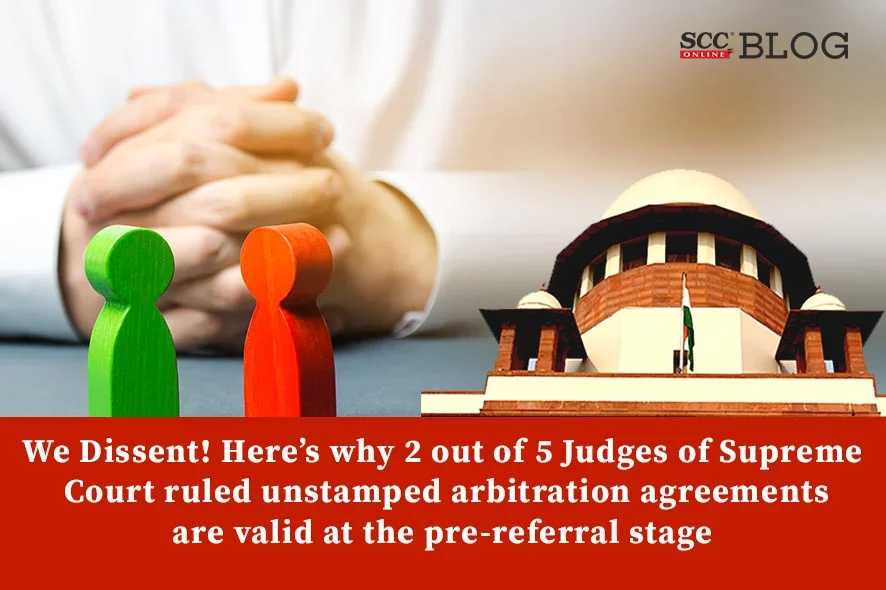Supreme Court: Resolving the conundrum over the scope of judicial review and the validity/enforceability of the unstamped/insufficiently stamped arbitration agreement contained in an underlying contract, the 5-Judge Bench comprising of K.M. Joseph, Ajay Rastogi, Aniruddha Bose, Hrishikesh Roy and C.T. Ravikumar, JJ. by a 3:2 majority, held that unstamped arbitration agreements are not valid in law. While Justices Ajay Rastogi and Hrishikesh Roy, JJ. dissented and opined that unstamped arbitration agreements are valid at the pre-referral stage.
Issue:
Whether the non-stamping of the substantive contract/instrument would render the arbitration agreement non-existent in law, void and unenforceable at the stage of Section 11 of the Arbitration Act, 1996 for the purpose of referring a matter for arbitration?
Whether the examination of stamping and impounding should be done at the threshold by the Section 11 judge, or should it be left to the arbitrator?
Analysis:
Justice Rastogi said that a plain reading of Section 35 of the Stamp Act, 1899 (‘Act, 1899’) suggests that an inadmissible instrument because of being unstamped or insufficiently stamped may be made admissible if the relevant stamp duty and a penalty is paid later. This shows that the requirement under Section 35 is not rigid and can be rectified even at a later stage. An unstamped or insufficiently stamped instrument is not completely invalid, and it can be made valid and admissible in evidence after fulfilling the conditions prescribed in the proviso to Section 35.
Placing reliance on Hariom Agrawal v. Prakash Chand Malviya, (2007) 8 SCC 514, Justice Rastogi said that the law on the subject is well settled that duly certified copy/photocopy of the alleged instrument cannot be validated by impounding, and this cannot be admitted in evidence under the Act, 1899. Thus, the deficiency in an instrument, whether it is unduly stamped or insufficiently stamped, can be rectified through a procedure as prescribed under the Act, 1899. It clearly indicates that the requirement under the Act can indeed be fulfilled even after the time when the instrument was executed. The requirement under the Act is not rigid or strict, to make the instrument invalid at the first instance.
He further stated that the purpose of the Act, 1899 is not to declare an instrument as completely invalid if it is unstamped or insufficiently stamped, but to collect the stamp duty on each instrument. The object of the Act 1899 is to secure revenue for the state.
Justice Roy said that the legislative intent and object behind the Act, 1899, is to secure revenue for the State and it is an Act reflecting the fundamental policy of Indian law. Thus, policy considerations and securing revenue must also be kept in mind while interpreting the provisions of the Stamp Act, 1899.
He said that the objective behind the enactment of the Arbitration and Conciliation Act, 1996 (‘Act, 1996’) was to, inter alia, avoid procedural complexity and the delay in litigation before Courts. Impounding and stamping at the Section 11 stage would frustrate the very purpose of the amended Arbitration Act, 1996 as the enforcement of arbitration agreements would be stalled on an issue, which is capable of being resolved at a later stage. To defer stamping to the stage of the arbitrator would achieve the objective of both the Arbitration Act, 1996 and the Stamp Act, 1899.
Thus, in his opinion the examination of stamping and impounding need not be done at the threshold by a Court, at the pre-reference stage under Section 11 of the Act, 1996. Further, non-stamping/insufficient stamping of the substantive contract/instrument would not render the arbitration agreement non- existent in law and unenforceable/void, for the purpose of referring a matter for arbitration.
As per Justice Roy, the Court in Garware Wall Ropes Ltd. v. Coastal Marine Constructions and Engineering Limited, (2019) 9 SCC 209 wrongly applied the principle given in United India Insurance Co. Ltd. v. Hyundai Engg. & Construction Co. Ltd., (2018) 17 SCC 607 to hold that an arbitration agreement would not exist-in-law if it is unstamped/insufficiently stamped. An arbitration agreement should not be rendered void if it is suffering stamp deficiency which is a curable defect. To this extent, he said that Garware(supra) and Hyundai(supra) do not set out the correct law.
The Dissenting Judges held that that the existence of a copy/certified copy of an arbitration agreement whether unstamped/ insufficiently stamped at the pre-referral stage is an enforceable document for the purposes of appointment of an Arbitrator under Section 11(6A) of the Act, 1996 where the judicial intervention shall be minimal confined only to the prima facie examination of “existence of an arbitration agreement” alone keeping in view the object of 2015 amendment and the courts must strictly adhere to the time schedule for the appointment of Arbitrator prescribed under Section 11(13) of the Act, 1996.
The Dissenting Judges held that all the preliminary/debatable issues including insufficiently stamped/unduly stamped or validity of the arbitration agreement etc. are referrable to the Arbitrator/Arbitral Tribunal under Section 16 of the Act, 1996 which, by virtue of the Doctrine of Kompetenz – Kompetenz has the power to do so.
Further, the Judges overruled the decision in SMS Tea Estates (P) Ltd. v. Chandmari Tea Co. (P) Ltd., (2011) 14 SCC 66. Also, overruled Paragraphs 22 and 29 in Garware (supra) which were approved in paragraphs 146 and 147 in Vidya Drolia v. Durga Trading Corpn., (2021) 2 SCC 1
Also Read: Unstamped Arbitration Agreements are not Valid in Law: SC | SCC Blog (scconline.com)
[N.N. Global Mercantile Pvt. Ltd. v. Indo Unique Flame Ltd., 2023 SCC OnLine SC 495, decided on 25-04-2023]







